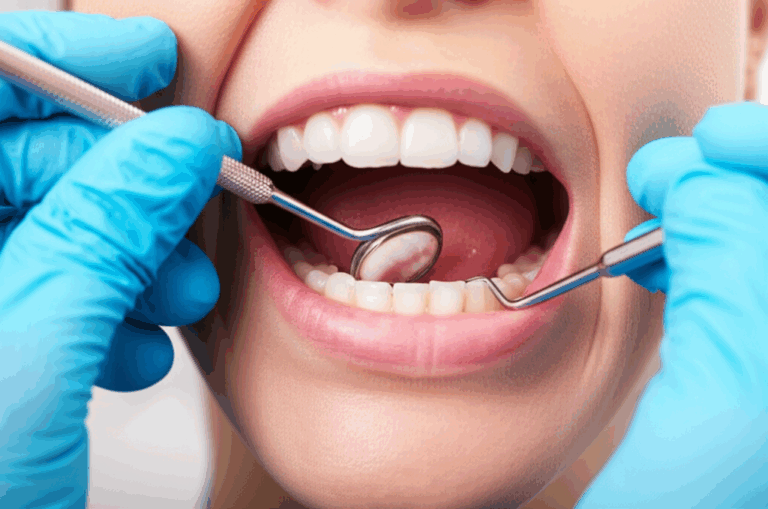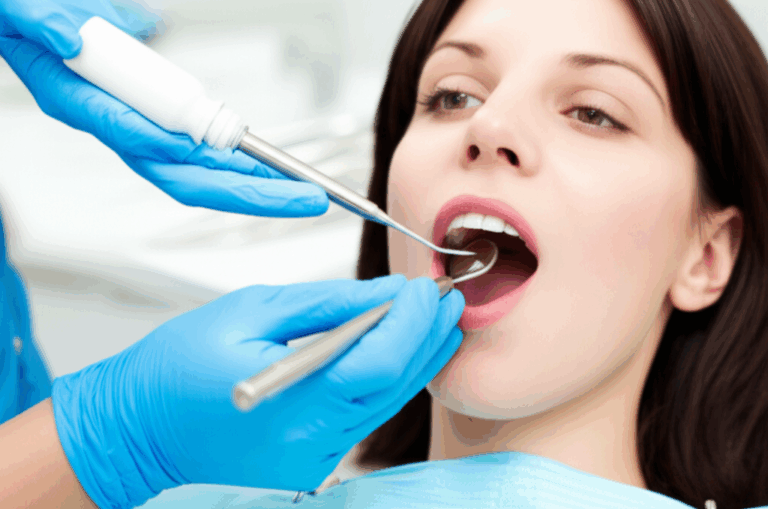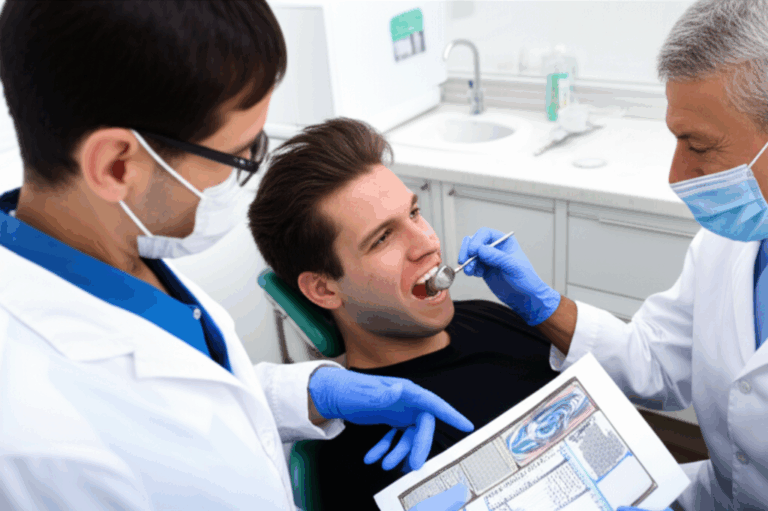
Do I See a Doctor or Dentist for Tongue Issues? My Guide to Getting the Right Oral Health Care
Table of Contents
- Localized Oral Problems
- The Dentist’s Referral Network
- Systemic Health Clues
- How Doctors Handle Referrals
- The Power of Collaboration for Complex Tongue Issues
- Oral Cancer Screening: A Shared Responsibility
Introduction: Why Tongue Issues Are So Confusing
If you’ve ever woken up with a sore tongue, noticed a weird spot, or felt a burning feeling in your mouth, you might have wondered, “Should I see my doctor or my dentist for this?” I’ve been confused about this too—searching online, not sure who to call, and feeling a little lost.
Tongue problems can be strange and even scary. Some seem to be a dentist thing. Others seem like you need a doctor. And a lot of them are somewhere in the middle. So, how do you know who can help? In this article, I’ll show you what I’ve figured out, with advice from dental and medical experts, to help you make the right choice for your mouth.
When Your Dentist Should Be Your First Call
I used to think my dentist only took care of my teeth and gums, but over the years, I learned that dentists actually know a lot about tongue problems too. The mouth is their area, after all.
Localized Oral Problems
When I’ve had things like:
- A strange white stuff on my tongue,
- Bad breath,
- Sore spots from accidentally biting my tongue,
- Red or black fuzzy spots,
- Bumps from braces or retainers,
- Mouth ulcers or canker sores on or around my tongue,
…my dentist was the first person I called. Most of these tongue problems have to do with mouth care or small injuries, and my dentist always had good advice. They know when a sore will get better on its own and when something is more serious.
Once during a regular check-up—which I forget to go to sometimes—my dentist saw a red spot on my tongue I hadn’t noticed. It was nothing serious, but it showed me just how closely they check your whole mouth, not just your teeth. They’re trained to look at your tongue for odd changes, bumps, or sores.
Dentists also help with:
- Tips for better mouth cleaning (like gently brushing your tongue)
- Problems from things like dentures or braces that bother your tongue
- Local infections, like thrush (especially if you have diabetes or just finished antibiotics)
- Explaining changes in taste after a dental job or new medicine
I once forgot to brush my tongue, letting gross white stuff build up (which looked bad but went away after cleaning).
The Dentist’s Referral Network
Dentists know what they can handle and when to send you to someone else. If they see something worrying—like a sore that isn’t healing, or a spot that should be checked out—they’ll send you to a mouth surgeon or specialist. For anything they can’t fix, they’ll get you to the right place, and that can make a big difference.
Someone in my family had a sore that wouldn’t go away. Their dentist sent them to a specialist, who figured out what was wrong quickly. That kind of teamwork between dentists and doctors is really important, especially if the problem is linked to your whole body.
When a Doctor Needs to Step In for Tongue Problems
I used to ignore tongue problems unless they hurt, but I learned that sometimes, you need to go to your doctor—especially if your tongue problem isn’t just about your mouth.
Systemic Health Clues
You should call your doctor if your tongue problem comes with:
- Fever, feeling tired, or swollen glands
- Pain or rashes in other parts of your body
- Really dry mouth that doesn’t get better with water
- Tongue burning or numbness that lasts, even though your tongue looks normal
- Swelling that makes it hard to swallow or talk (this can get serious fast)
- New medicine, since some drugs can mess with your tongue
- Autoimmune diseases (like Lupus, Sjögren’s, or lichen planus)
- Not enough nutrients (like B12, iron, folate—these can make your tongue smooth and sore)
Once I felt super tired with a red, swollen tongue during winter. My dentist said it could be more than a mouth problem, and told me to see my doctor. Blood tests showed I was low in iron. With vitamins and eating differently, the symptoms went away. That showed me—tongue problems aren’t always just about your mouth.
For burning mouth syndrome (when your tongue burns but looks normal), my doctor checked with tests and follow-ups. It was nice to have someone looking at the big picture.
How Doctors Handle Referrals
Doctors often act like guides, sending you to the right people. If they think an ENT (ear, nose, and throat doctor) should see you, they’ll set it up. Skin doctors and mouth specialists also help, especially for tongue problems with skin or immune system links.
I once had mouth sores that wouldn’t heal. My GP started checking, made sure it wasn’t an infection or vitamin problem, and then sent me to a mouth specialist. That teamwork made a big difference.
When Doctors and Dentists Work Together
Sometimes, figuring out your tongue problem isn’t a one-person job. It takes a team.
The Power of Collaboration for Complex Tongue Issues
When things get tricky—like when a tongue spot doesn’t make sense, or symptoms go past your mouth—dentists and doctors team up. Mouth medicine specialists are good at this because they know both sides.
I’ve seen times when a dentist found possible early mouth cancer. Right away, the dentist sent the patient to a surgeon and cancer doctor. The whole team worked together—checking tests, planning treatment. That teamwork can save lives.
Oral Cancer Screening: A Shared Responsibility
Both dentists and doctors play a big part in finding mouth cancer early. Dentists spot it first a lot, during regular check-ups. But doctors can see the signs too, especially with symptoms like unexplained weight loss, pain, or swelling.
A friend of mine had a weird white spot found during a cleaning. The dentist sent him to a specialist, and quick action led to a good outcome. Don’t forget—check-ups are about more than just your teeth.
Common Tongue Issues: Who Should You See First?
I made my own cheat sheet for tongue problems—here’s what I use to decide:
- Geographic Tongue: I go to my dentist first to check and watch it. If it hurts a lot or feels like a bigger issue, I call my doctor.
- Oral Thrush: Dentist usually handles it if it’s mild. If it keeps coming back, goes outside my mouth, or my immune system is weak, I see my doctor.
- Black Hairy Tongue: Usually something for the dentist. They help with mouth cleaning, but if I just started new meds or have other health problems, I talk to my doctor too.
- Glossitis or Painful Tongue: If it’s from injury, dentist first. If I think I need more iron or vitamins, my doctor checks it out.
- White or Red Patches: Dentist looks first and might do a biopsy. If needed, a mouth surgeon or specialist joins in.
- Burning Mouth Syndrome: Usually my doctor handles this, since it can be about nerves or hormones, but dentist checks for simple stuff first.
- Canker Sores: If I have one or two, dentist helps. If sores are bad or keep coming back, my doctor looks for causes.
- Swollen Tongue: Fast swelling or trouble breathing—go to the ER. Small swelling from biting—dentist can help.
This guide works for me. If I’m not sure, I think about where it started and what other signs I have.
When to Seek Emergency Care
Some tongue problems can’t wait. I look out for:
- Bad, fast swelling that blocks my throat or makes swallowing hard (like a bad allergic reaction)
- Bad bleeding from a tongue injury
- Suddenly can’t move my tongue (numb all of a sudden)
- Signs of spreading infection (high fever, swelling, pus under the tongue, redness down the neck)
If I see any of these, I get emergency help right away.
Getting Ready for Your Appointment
Before I see my dentist or doctor, I write down:
- How long these things have gone on
- What it feels and looks like (color, size, pain, swelling, taste changes)
- Are there triggers? Foods, new medicine, stress, new dental work?
- Any other symptoms—fever, sore throat, body aches?
- Family history of mouth cancer or other diseases?
- What medicine, vitamins or supplements am I taking?
- Have I started smoking, drinking more, or changed my mouth cleaning habits?
This info helps the doctor or dentist figure things out faster and helps me get better care.
Preventing Tongue Problems and Keeping Your Mouth Healthy
Most tongue issues can be avoided if you take care of your mouth every day. What works for me:
- Brush my tongue gently every day (not just my teeth)
- Floss daily
- Rinse out my mouth after eating spicy or sour foods
- Drink enough water to keep my mouth from getting dry
- Avoid tobacco, cut down on alcohol, and skip super spicy foods if my tongue gets sore
- Get regular dental check-ups (1–2 times a year)
- See my doctor for regular blood tests—good food and vitamins help my mouth too
I’ve learned my tongue is like an early warning sign for the rest of my body. When it looks good, I feel better.
My Final Advice: Picking the Right Professional
After many trips to both doctors and dentists—sometimes because my family worried—I’ve found it’s best to start with whoever fits your problem most:
- For things about mouth care, small injuries, dental devices, or local infections, I see my dentist.
- For problems that go beyond my mouth, with fevers or whole-body clues, I see my doctor.
- If I can’t decide, or if I find a new bump or sore that lasts, I go to whoever I can see first—they’ll send me to the right place if needed.
For serious stuff—like fast swelling, choking, or uncontrollable bleeding—I always get emergency help.
Listen to your gut. Your mouth matters, and getting help early can save you a lot of worry—and maybe more.
If you’re curious about dental tech or want to know how dental labs help with tongue-related treatments, I suggest learning how digital dental labs and dental ceramics labs help with mouth care. For things like mouth appliances, a good china dental lab can make a big difference, and talking to your dentist about your choices can really help you stay in control of your mouth health.
Reviewed by Dr. Joe Dental, DDS—whose tips have helped shape how I take care of my mouth.
Remember, your tongue shows how your whole body is doing. Pay attention to it, get help when you need it, and don’t be afraid to ask questions. It can really make a difference for your health and your peace of mind.








